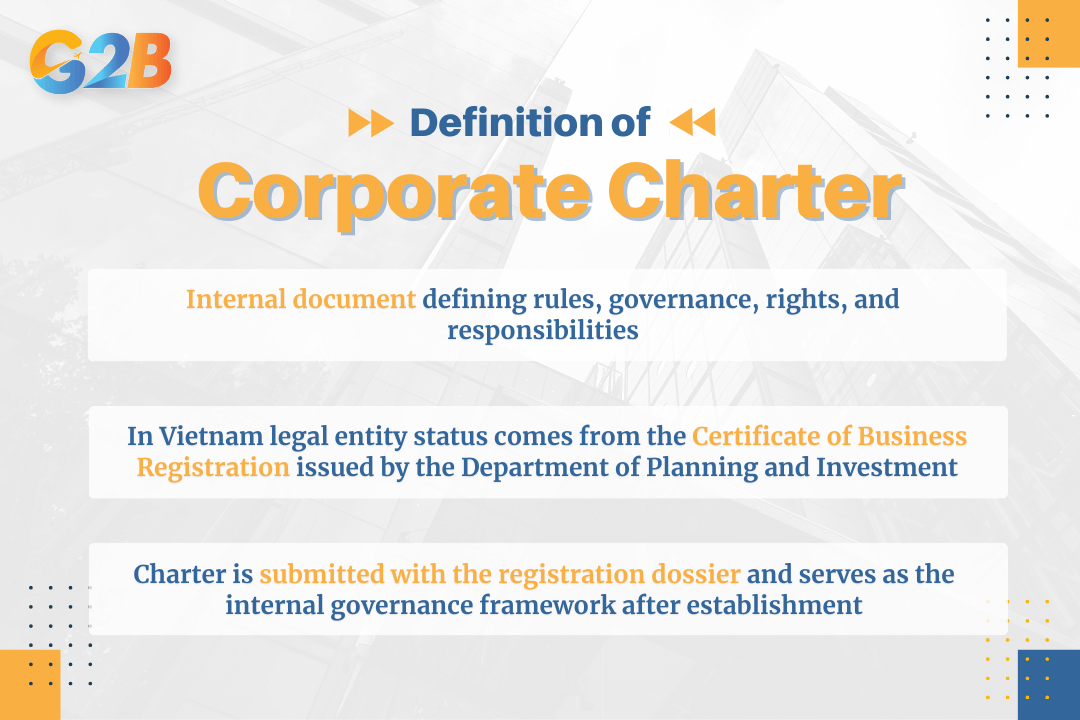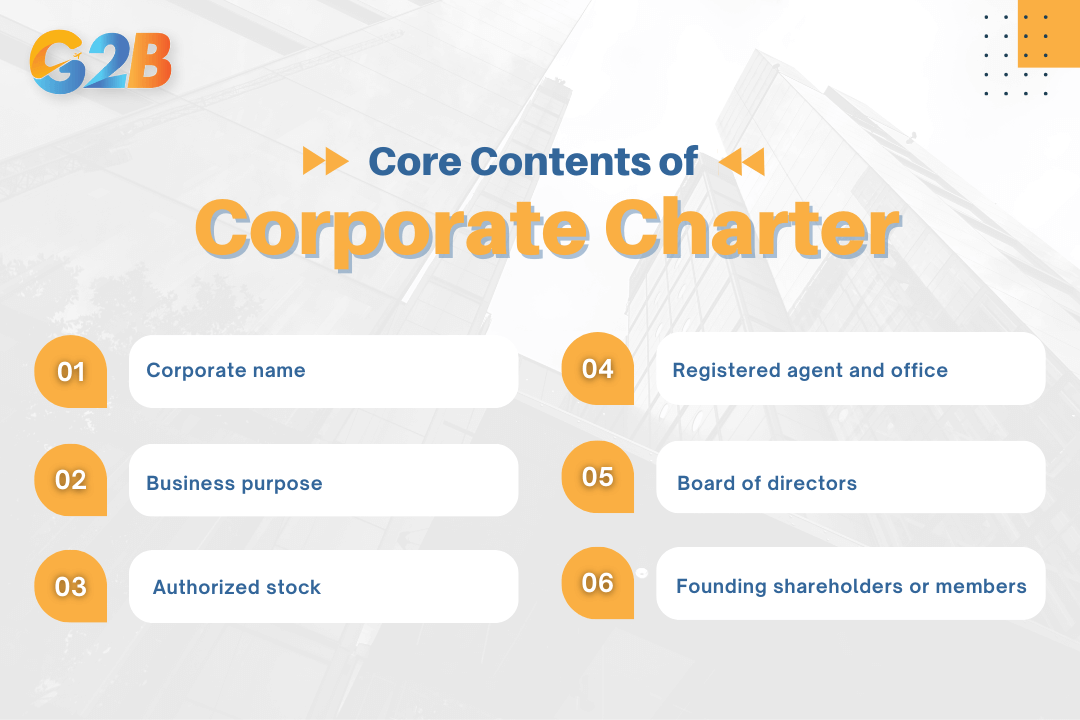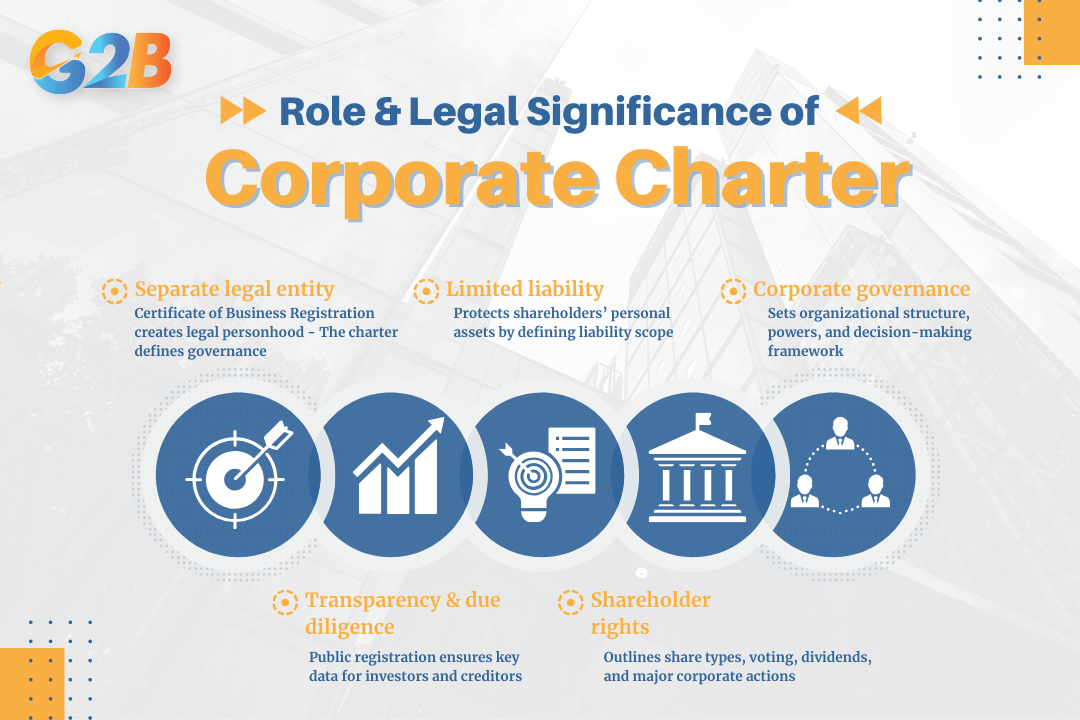A Corporate Charter is the foundational legal document that serves as a company's constitution, confirming its legal existence and defining its core structure. This document, once filed and approved by the state, marks the official birth of a corporation, transforming a business idea into a recognized legal entity. Without it, the business cannot legally operate as a corporation, leaving its owners personally exposed to debts and liabilities. Let’s explore the key components and the process for making amendments in this article.
What is a corporate charter?
A corporate charter (company charter) is an internal document of the company that outlines its rules, governance structure, rights, and the responsibilities of its members or shareholders. However, the official document that legally establishes a company as a separate legal entity in Vietnam is the Certificate of Business Registration, which is issued by the Department of Planning and Investment of the province or city where the company is located.
Unlike some countries, such as the United States, where incorporation documents are filed with a state's Secretary of State, in Vietnam, the authority responsible for company registration is the Department of Planning and Investment, which issues the Certificate confirming the company’s establishment.
The Company Charter is not submitted separately as a founding document but rather accompanies the business registration dossier and serves as the internal governance framework once the company has been established. This document is essential in regulating how the company operates, how decisions are made, and the relationship between shareholders or members.
Understanding the charter is the first step in the business formation process, as it defines the company’s structure and governance. Once this foundation is clear, the next essential move is setting up the company properly through a reliable incorporation service in Vietnam.

A corporate charter is an internal document of the company that outlines its rules
Core contents of a corporate charter
While the specific requirements for a corporate charter are regulated by law and must comply with the Law on Enterprises; however, the official establishment of a company is done through filing a business registration dossier and obtaining a Certificate of Business Registration, issued by the Department of Planning and Investment, several core components are universally required to properly establish and manage a company in Vietnam:
- Corporate name: The Company Charter includes the official company name, which must be unique within the entire country and approved by the Department of Planning and Investment during registration. Unlike some countries that require a corporate designator such as "Incorporated," "Corporation," or "Inc.," in Vietnam, the company name must include the appropriate designation according to the company type such as Limited Liability Company or Joint Stock Company.
- Business purpose: The company charter typically includes a detailed list of specific business sectors or industries according to the National Business Classification as registered with the authorities. While companies may desire operational flexibility, to expand or engage in new business sectors not previously registered usually requires amending the charter and notifying or getting approval from competent authorities depending on the industry conditions. The broad clause “engaging in any lawful activity” is generally not used alone in Vietnam because business registration requires an explicit declaration of business lines.
- Authorized stock: This is mainly applicable to Joint Stock Companies, where the charter must specify the charter capital, the number of shares issued, classes of shares (such as common stock with voting rights and preferred stock with dividend priority), and the nominal (par) value per share. For Limited Liability Companies, shares are not issued; instead, the charter capital is divided based on members’ capital contributions.
- Registered agent and office: Vietnamese law requires a company to have a registered office address where official legal and government documents are sent. However, the concept of a registered agent - a designated person or entity responsible for receiving legal documents on behalf of the company - does not exist in Vietnamese law. The company itself is responsible for receiving official correspondence at its registered office.
- Board of directors: The charter usually regulates the structure, powers, and responsibilities of the Board of Directors (for Joint Stock Companies). Initial members of the board are declared in the registration dossier but their names are not necessarily included in the publicly disclosed charter. The Board of Directors governs strategic decisions and oversees company management until the first shareholder meeting.
- Founding shareholders or members: Unlike some jurisdictions where “incorporators” are formally identified as the persons filing founding documents, Vietnamese law does not require listing "incorporators." Instead, the company charter or registration dossier names the founding shareholders or members who participate in establishing the company.

There are 6 core contents of a corporate charter
Role and legal significance of the corporate charter
The corporate charter is far more than an administrative formality; it is a document with profound legal weight that defines the corporation's existence and powers. Its significance extends through every aspect of corporate governance, liability, and shareholder relations.
Creation of a separate legal entity
The most critical function of establishing a company in Vietnam is the issuance of the Certificate of Business Registration, which creates a separate legal entity distinct from its owners, directors, and shareholders. The company charter then defines internal governance but does not itself create legal personhood.
Foundation for limited liability
A direct and vital consequence of the creation of a separate legal entity in Vietnam is the establishment of limited liability for shareholders or members, depending on the company type (e.g., Limited Liability Company or Joint Stock Company). The company charter defines the scope and extent of this limited liability, protecting personal assets from company debts and obligations.
Framework for corporate governance
The company charter serves as the primary governing document that defines the company’s organizational structure, internal powers and limits of governing bodies such as the Board of Directors and General Meeting of Shareholders, in compliance with Vietnamese law. This provides a clear framework for decision-making and ensures that the actions of the board of directors and officers align with the company's stated objectives.
Basis for due diligence and transparency
Unlike in some jurisdictions, the company charter in Vietnam is not a public document filed with the state but an internal document within the company. However, the Certificate of Business Registration and related official business registration data provide transparency to investors, creditors, and stakeholders. This public record includes key information like charter capital and shareholder rights, enabling due diligence during corporate transactions.
Defining shareholder rights
The company charter includes provisions specifying the types and number of authorized shares, shareholder rights such as voting and dividend entitlements, and procedures for major corporate actions including mergers and dissolution, ensuring a clear understanding of shareholder roles under Vietnamese law.

There are 5 roles and the legal significance of the corporate charter
Distinguishing between the corporate charter and the bylaws
A common point of confusion in corporate governance is the difference between a corporate charter and corporate bylaws. While both documents are essential for a corporation's proper functioning, they serve distinct and complementary purposes. In simple terms, the charter is the "what" - it creates the company and defines its core structure - while the bylaws are the "how" - they provide the detailed rules for its day-to-day operation.
In Vietnam, the company charter is an internal document prepared and submitted as part of the business registration dossier to the Department of Planning and Investment; it is not a standalone public document like a corporate charter in some jurisdictions. Vietnam does not have a separate document known as “bylaws”; governance rules are contained within the company charter and relevant internal resolutions.
Here is a clear comparison of their key differences:
| Feature | Corporate charter (Articles of incorporation) | Corporate bylaws |
|---|---|---|
| Purpose | Establishes the corporation as a legal entity. | Dictates the internal rules for managing the company. |
| Audience | Public document for state agencies, investors, and the public. | Private, internal document for shareholders, directors, and officers. |
| Filing requirement | Mandatory as part of business registration dossier; must be approved and registered by the Department of Planning and Investment. | Do not exist as separate documents, therefore not filed. |
| Core contents | Name, purpose, authorized stock, registered agent, and incorporators. | Meeting procedures, voting rules, officer duties, and director elections. |
| Legal hierarchy | Superior to bylaws. Takes legal precedence in case of conflict. | Subordinate to the corporate charter and state laws. |
| Amendment process | Requires shareholder approval and registration of amendments with the Department of Planning and Investment. | No separate amendment process as bylaws do not exist independently. |
The corporate charter is more than just a piece of paperwork filed during company formation; it is the "constitution" of the business. It is the indispensable document that establishes a corporation's legal personhood, provides the crucial shield of limited liability, and defines the fundamental structure of its ownership and governance. From authorizing the first shares of stock to guiding the formal process of dissolution, the charter's role is central to a corporation's legal integrity and operational framework.


 Delaware (USA)
Delaware (USA)  Vietnam
Vietnam  Singapore
Singapore  Hong Kong
Hong Kong  United Kingdom
United Kingdom 
